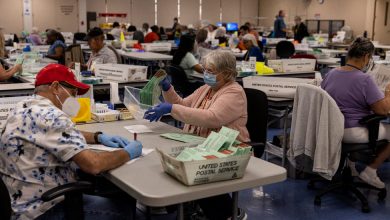Trump Aides Watch Testimony and Brace for Damage

WASHINGTON — Devastating new testimony by a former White House aide describing a president desperately clutching to power, indifferent to the danger threatening his No. 2 and potentially tampering with congressional witnesses, raised concerns among current and former advisers to Donald J. Trump on Tuesday about the possible legal and political consequences.
Reactions were far from unanimous, however, and some confidants of the former president said they doubted whether the testimony of Cassidy Hutchinson, a former aide to Mr. Trump’s White House chief of staff, ranked particularly high in the pantheon of controversies to embroil him in his six years as a national political figure.
One Trump associate, speaking on condition of anonymity, downplayed the impact of Ms. Hutchinson’s testimony, acknowledging that it painted a picture of Mr. Trump as unhinged on Jan. 6 but saying that this should surprise no one at this point.
Still, some present and former associates of Mr. Trump expressed concern that the totality of Ms. Hutchinson’s testimony would do serious damage to him politically as he considers a third presidential campaign.
“Things went very badly for the former president today,” Mick Mulvaney, a former White House chief of staff, wrote on Twitter. “My guess is that it will get worse from here.”
One trusted current adviser called the testimony “a killer.”
Ms. Hutchinson told the House committee investigating the attack of Jan. 6, 2021, that Mr. Trump had demanded that aides stop the security checks, with metal detectors, at his rally on the Ellipse before the riot — though some supporters with weapons had already been turned away — in order to ensure that a larger crowd would appear in television shots during his speech. She said Mr. Trump had done so despite knowing that some in the crowd were armed, explaining that his supporters were not there to attack him.
Ms. Hutchinson testified that a Secret Service agent had told her that Mr. Trump had violently lashed out — grabbing for the steering wheel and lunging at another agent’s collarbone — when his protective detail refused to drive him to the Capitol as protesters streamed there on foot, insisting instead on returning him to the White House.
And, when asked about chants from Trump supporters that Vice President Mike Pence should be hanged, Ms. Hutchinson testified that her boss, the White House chief of staff, Mark Meadows, had quoted Mr. Trump as saying that “Mike deserves it.”
Current and former aides to Mr. Trump sent one another messages as the hearing took place, describing a series of disclosures that they conceded were potentially quite damaging, mostly politically but also, potentially, legally.
If Mr. Trump was indeed warned that people were armed and still encouraged them to walk to the Capitol, some advisers said privately, that could potentially bolster a charge against him related to incitement.
Others said it was exculpatory of Mr. Trump that, in his speech, he had urged protesters to march on the Capitol “peacefully.”
Within hours after Ms. Hutchinson’s testimony had concluded, a number of Trump advisers seized upon her account of Mr. Trump’s trying to grab the wheel of the S.U.V. he was being driven in as by far the most explosive new allegation against him — and the one that they most hoped to discredit.
Late Tuesday afternoon, Secret Service officials who requested anonymity to discuss the potential testimony said that both Robert Engel, the head of Mr. Trump’s protective detail, and the driver of the vehicle were prepared to state under oath that neither man was assaulted by the former president and that he did not reach for the wheel. The officials said the two men would not dispute the allegation that Mr. Trump wanted to go to the Capitol.
But several current and former Trump aides also expressed concern about the committee’s suggestion, at the tail end of the day’s hearing, that someone close to Mr. Trump has tried to tamper with or intimidate the committee’s witnesses by reminding them that Mr. Trump reads the panel’s transcripts. Such interference could be prosecuted criminally.
Mr. Mulvaney, who called the hearing a “stunning two hours,” called the warning about witness tampering a “real bomb that got dropped.”
Tuesday’s testimony was only the latest instance in which a former Trump aide or administration official raised a right hand and testified under oath about shocking scenes of Mr. Trump’s behavior behind closed doors. And Mr. Trump has long shown a gravity-defying ability to escape the most dire predicaments and even turn them to his advantage.
Key Revelations From the Jan. 6 Hearings
Making a case against Trump. The House committee investigating the Jan. 6 attack appears to be laying out evidence that could allow prosecutors to indict former President Donald J. Trump, though the path to a criminal trial is uncertain. Here are the main themes that have emerged so far:
An unsettling narrative. During the first hearing, the committee described in vivid detail what it characterized as an attempted coup orchestrated by the former president that culminated in the assault on the Capitol. At the heart of the gripping story were three main players: Mr. Trump, the Proud Boys and a Capitol Police officer.
Creating election lies. In its second hearing, the panel showed how Mr. Trump ignored aides and advisers as he declared victory prematurely and relentlessly pressed claims of fraud he was told were wrong. “He’s become detached from reality if he really believes this stuff,” William P. Barr, the former attorney general, said of Mr. Trump during a videotaped interview.
Pressuring Pence. Mr. Trump continued pressuring Vice President Mike Pence to go along with a plan to overturn his loss even after he was told it was illegal, according to testimony laid out by the panel during the third hearing. The committee showed how Mr. Trump’s actions led his supporters to storm the Capitol, sending Mr. Pence fleeing for his life.
Fake elector plan. The committee used its fourth hearing to detail how Mr. Trump was personally involved in a scheme to put forward fake electors. The panel also presented fresh details on how the former president leaned on state officials to invalidate his defeat, opening them up to violent threats when they refused.
Strong arming the Justice Department. During the fifth hearing, the panel explored Mr. Trump’s wide-ranging and relentless scheme to misuse the Justice Department to keep himself in power. The panel also presented evidence that at least half a dozen Republican members of Congress sought pre-emptive pardons.
Trump’s rage. Cassidy Hutchinson, a former aide to Mr. Trump’s final chief of staff, delivered explosive testimony during the panel’s sixth hearing, saying that the president knew the crowd on Jan. 6 was armed, but wanted to loosen security. She also revealed that Mr. Trump, demanding to go to the Capitol, tried to grab his vehicle’s steering wheel from a Secret Service agent.
His first impeachment trial, in early 2020, was a fund-raising bonanza for his re-election campaign and led to a brief uptick in public opinion polls. His second impeachment attracted bipartisan support but ultimately failed, and Mr. Trump quickly consolidated — and has retained — his position as the most powerful figure in the Republican Party.
Mr. Trump reacted to Tuesday’s hearing by posting a dozen messages on his Truth Social website attacking Ms. Hutchinson and denying her most explosive testimony.
He said he had never complained about the size of the crowd at his Jan. 6 rally, had never claimed that Mr. Pence deserved to be hanged and had never tried to grab the wheel when Secret Service agents refused to drive him to the Capitol.
“Her fake story that I tried to grab the steering wheel of the White House limousine in order to steer it to the Capitol building is sick and fraudulent, very much like the unselect committee itself,” Mr. Trump wrote.
Mr. Trump’s modus operandi has long been to blow holes in specific elements of an accuser’s story as a way to discredit the larger narrative and to insist that he isn’t especially concerned about the threat an investigation presents.
That approach held on Tuesday, as his aides emphasized the degree to which the most explosive parts of Ms. Hutchinson’s testimony had rested on hearsay that she was relaying to the committee rather than on what she had witnessed herself, and they asserted that other elements of her account did not comport with their understanding of the facts.



